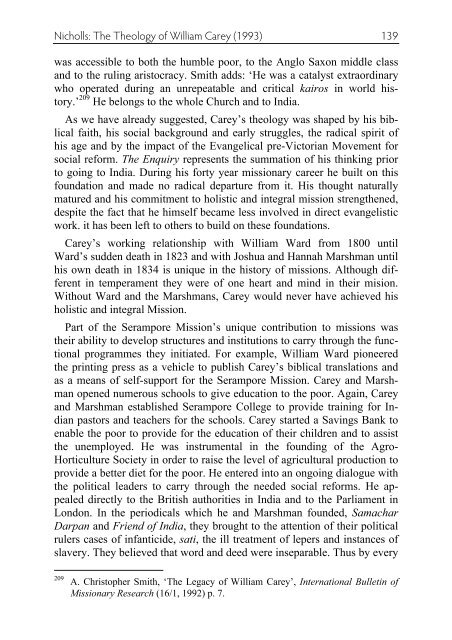Calvin and Missions - World Evangelical Alliance
Calvin and Missions - World Evangelical Alliance
Calvin and Missions - World Evangelical Alliance
Create successful ePaper yourself
Turn your PDF publications into a flip-book with our unique Google optimized e-Paper software.
Nicholls: The Theology of William Carey (1993) 139<br />
was accessible to both the humble poor, to the Anglo Saxon middle class<br />
<strong>and</strong> to the ruling aristocracy. Smith adds: ‘He was a catalyst extraordinary<br />
who operated during an unrepeatable <strong>and</strong> critical kairos in world history.’<br />
209 He belongs to the whole Church <strong>and</strong> to India.<br />
As we have already suggested, Carey’s theology was shaped by his biblical<br />
faith, his social background <strong>and</strong> early struggles, the radical spirit of<br />
his age <strong>and</strong> by the impact of the <strong>Evangelical</strong> pre-Victorian Movement for<br />
social reform. The Enquiry represents the summation of his thinking prior<br />
to going to India. During his forty year missionary career he built on this<br />
foundation <strong>and</strong> made no radical departure from it. His thought naturally<br />
matured <strong>and</strong> his commitment to holistic <strong>and</strong> integral mission strengthened,<br />
despite the fact that he himself became less involved in direct evangelistic<br />
work. it has been left to others to build on these foundations.<br />
Carey’s working relationship with William Ward from 1800 until<br />
Ward’s sudden death in 1823 <strong>and</strong> with Joshua <strong>and</strong> Hannah Marshman until<br />
his own death in 1834 is unique in the history of missions. Although different<br />
in temperament they were of one heart <strong>and</strong> mind in their mision.<br />
Without Ward <strong>and</strong> the Marshmans, Carey would never have achieved his<br />
holistic <strong>and</strong> integral Mission.<br />
Part of the Serampore Mission’s unique contribution to missions was<br />
their ability to develop structures <strong>and</strong> institutions to carry through the functional<br />
programmes they initiated. For example, William Ward pioneered<br />
the printing press as a vehicle to publish Carey’s biblical translations <strong>and</strong><br />
as a means of self-support for the Serampore Mission. Carey <strong>and</strong> Marshman<br />
opened numerous schools to give education to the poor. Again, Carey<br />
<strong>and</strong> Marshman established Serampore College to provide training for Indian<br />
pastors <strong>and</strong> teachers for the schools. Carey started a Savings Bank to<br />
enable the poor to provide for the education of their children <strong>and</strong> to assist<br />
the unemployed. He was instrumental in the founding of the Agro-<br />
Horticulture Society in order to raise the level of agricultural production to<br />
provide a better diet for the poor. He entered into an ongoing dialogue with<br />
the political leaders to carry through the needed social reforms. He appealed<br />
directly to the British authorities in India <strong>and</strong> to the Parliament in<br />
London. In the periodicals which he <strong>and</strong> Marshman founded, Samachar<br />
Darpan <strong>and</strong> Friend of India, they brought to the attention of their political<br />
rulers cases of infanticide, sati, the ill treatment of lepers <strong>and</strong> instances of<br />
slavery. They believed that word <strong>and</strong> deed were inseparable. Thus by every<br />
209 A. Christopher Smith, ‘The Legacy of William Carey’, International Bulletin of<br />
Missionary Research (16/1, 1992) p. 7.

















